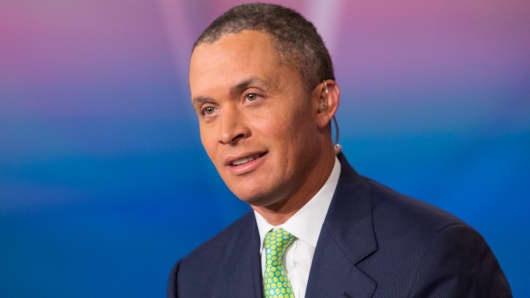News of former congressman Harold Ford, Jr.'s firing by Morgan Stanley brings to mind a big new question:
Is the sexual harassment tsunami that's barreling through Hollywood and Capitol Hill coming to Wall Street?
Not surprisingly, there are two schools of thought on the subject.
One side says Wall Street already went through a sexual misconduct and harassment purge years ago and has relatively indemnified itself via a series of tangible changes.
It can also be said that Ford is not really a representative of Wall Street and is really just another politician connected to misconduct. He's still more of a political figure in the public eye as a regular political commentator on MSNBC.
But the idea that Wall Street will come out of this relatively unscathed doesn't seem to hold up to the smell test. Perhaps the best example of how many of us react to claims Wall Street is relatively clean came from the satirical site Dealbreaker with its recently published piece titled, "Thank God there is no sexual abuse on Wall Street."
Jokes aside, there are a number of very strong signs that America's leading financial firms are in for a good portion of sexual harassment pain and blood-letting to come.
In fact, it may just be beginning. Just in October, Fidelity Investments portfolio manager C. Robert Chow resigned after colleagues accused him of making inappropriate sexual comments, and tech fund manager Gavin Baker resigned for allegedly harassing a 26-year-old female employee.
Or maybe it's just been going on for years and we just stopped paying attention until now. For example, a case is still winding its way though the courts that could end up becoming one of the most expensive sexual harassment and discrimination settlements ever. That would be the Chen-Oster et al v. Goldman Sachs & Co. lawsuit. The plaintiffs in that case accuse Goldman of paying women less than men, giving them weaker performance reviews, and subjecting them to sexual harassment for years. To give you an idea of how high the stakes are in this case, the plaintiffs and Goldman have been fighting over procedural aspects of the lawsuit since 2010.
Finally, it's important to remember that the actions that constituted serious misconduct several years ago are not the same as they are now. The resignations of Sen. Al Franken and Rep. Trent Franks on Thursday seem to be much more the result of something closer to a new zero-tolerance policy on harassment and lower-level assault.
That doesn't excuse Franken, Franks, Ford or anyone else recently ensnared in this wave of scandals. And there's a lot to be said for holding our elected leaders to a much higher standard on this issue. But it's also fair to say that Wall Street may have only purged itself from the most egregious examples of bad behavior toward women based on standards from the 1990s or even the early 2000s.
That's the assessment financial journalist Susan Antilla, author of the groundbreaking book, "Tales From the Boom-Boom Room: The Landmark Legal Battles that Exposed Wall Street's Shocking Culture of Sexual Harassment." Antilla has recently spoken out about how she believes Wall Street has made strides to battle harassment over the past two decades, but adds that bias still very much exists.
In a world where sitting senators and congressmen can be forced out in a matter of days over unproven allegations, that means Wall Street is still very vulnerable. This is something everyone from the lawyers fighting for Goldman Sachs in federal court to the H.R. departments at every other big firm need to realize.
Getting back to Ford, it's important to note he isn't going quietly. "I have never forcibly grabbed any woman or man in my life," Ford said in a statement released Thursday. In an even more telling comment, a lawyer for Ford said that, "Morgan Stanley has still not told Harold directly of his termination, and unlike every other circumstance I've been in, the company has refused to provide me with a reason. This all demonstrates how this was a matter of convenience during a hyper-sensitive time and not based on real facts."
Those comments stand as very strong proof that rules are already starting to change on Wall Street. If the standards for Ford are extended industry wide, expect a dozen or so managing partners and higher-level executives to be ousted in the coming year.
Once the dust settles from those firings and resignations, Wall Street will have to join Congress, Hollywood, Silicon Valley and Main Street in a major re-evaluation of its workplace rules. Anyone who thinks we're even halfway through this process is fooling themselves.
Commentary by Jake Novak, CNBC.com senior columnist. Follow him on Twitter @jakejakeny.
For more insight from CNBC contributors, follow @CNBCopinion on Twitter.



